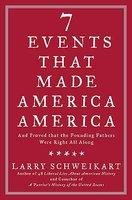Physical Address
304 North Cardinal St.
Dorchester Center, MA 02124
Physical Address
304 North Cardinal St.
Dorchester Center, MA 02124

The Best and Latest in Conservative Thought

Modern history wants to teach that America is structurally racist, a bastion of inequality and a warmonger. In fact, it’s the country that has raised more people out of poverty and tyranny than any other in history, but if you sit through a modern history class you’ll likely hear about none of that.
Born out of an opposition to tyranny in a wild and untamed land, it’s had its issues. At the same time American brought the world the Civil Rights movement while saving the world from dictators numerous times.
But perhaps more importantly than that, it’s given its own citizens the freedom to live their lives, freely and in a way that they want to live them.
“The dreams of people may differ, but everybody wants their dreams to come true. And America, above all places, gives us the freedom to do that.” – Ronald Reagan
Conservative Values
If you’re looking to support conservative values then consider donating to Real Conservative Books so we can continue our work. Click here.
A Patriot’s History of the United States

Professors Larry Schweikart and Michael Allen were dismayed with the tone they saw in American history books. While America has its flaws, modern history books increasingly rely on the theory that everything about this country is broken. With that in mind, these two authors decided to tell the history of America how it really happened, with a focus on the core values of what makes it so great. From Columbus to Trump, this book details the four pillars of America’s creation: Christianity, Common Law, Private Property and a Free Market Economy.
The Politically Incorrect Guide to American History

Most modern history books or history classes will tell you America was created by racists on land stolen as a part of a genocide and that only now through a massive push towards forced equality has it done any good. In fact, none of that is true.
Historian Thomas E Woods Jr. knows that all totalitarians shaped the future by reinventing their past. And that’s what’s happening in America now.
If you want the real truth about real America, this book has it all, from the earliest settlers, the drafting of the Constitution, the Civil War, World Wars and more. Why America was founded on religious freedom. Why the founders weren’t racists. Why the balance of power is built into each state. And why every Democrat program ever has been an abject failure.
Simple and factual, this book looks like a silly coffee-table page flipper but contains more truth than almost any dry text book ever has.
48 Liberal Lies About American History: (That You Probably Learned in School)

In America’s schools, America’s youth are being taught everything wrong. This books aims to set things right.
Tackling 48 common myths about American history, Larry Schweikart crushes popular myths taught as facts in today’s schools, including that capitalist greed brought about the Great Depression and that the Constitution was created by elitists to serve their own economic interests.
Also check out Schweikart’s earlier work, A Patriot’s History of the United States.
A History of the American People

From the author of Modern Times, comes another great and insightful book focused specifically on the foundation and ongoing legacy of the United States of America.
“The creation of the United States of America is the greatest of all human adventures,” says Johnson. “No other national story holds such tremendous lessons, for the American people themselves and for the rest of mankind.”
America’s history is told through the stories of men and women who shaped it, with numerous first person accounts, from letters to diaries and (in the modern era) recorded conversations.
Johnson tackles the struggle for independence, the stain of slavery and the roaring US economy.
Fundamentally he frames America and its people as a country filled with struggles but where problem solving is woven into its framework. The American people are called to be leaders, tackling issues and overcoming them with hard work, ingenuity and faith.
Ethnic America: A History

A history of immigrants to American as told by their economics. One of America’s great economic thinkers, Thomas Sowell, details the history of nine different ethnic groups (Irish, Germans, Jews, Italians, Chinese, African-Americans, Puerto Ricans, and Mexicans) from their arrival in the United States until today.
America: The Last Best Hope (volume i)

While so much of history focuses on the lessons (ie mistakes) we can learn from the past, William J Bennett takes the opposite approach. In this elegantly written tour through American personalities, he provides tales of inspiration from those elected officials who were chosen to lead.
Written more like a novel than a history book, this work provides incredible details of courage, prudence and hard work. It is a work of “informed patriotism” and doesn’t just tell the stories of the past, but weaves them into an understanding of present day.
“America, The Last Best Hope” was inspired by the Ronald Reagan’s farewell address in which he cautioned that if we forget what we’ve done, we’ll forget who we are.
The Politically Incorrect Guide to the Constitution

A frank discussion of not only what the Constitution is, but of how its creators understood it and how they would be vehemently opposed to how it has been distorted.
Kevin R C Gutzman documents the emergence of “Constitutional Law” and how the Supeme Court has distorted the Constitution to interject their own opinions on everything from same sex marriage to abortion.
He goes a step further to highlight how this federal legal system has put in place a centralized legal power that runs contrary to the intentions of the decentralized Constitution which put the power in the hands of the individual states.
The Politically Incorrect Guide to the Civil War

Another great book in “The Politically Incorrect Guide” series, this may be the most controversial yet.
There are plenty of basic history lessons about the major players, from Grant to Lee to Stonewall Jackson. There’s also a recounting of the most important battles.
But more than that, there’s a chapter on what might have happened had the South actually won. And no, it doesn’t include modern day slavery. In fact, author H. W. Crocker III argues that slavery would have been abolished peacefully like in every other Western country. And an America led by the South would likely have had numerous other benefits to its citizens and the world.
This book is filled with little known, yet fundamentally important truths about American history, like how Robert E. Lee had a higher regard for African Americans than Lincoln did
In a world where the Civil War has already been fundamentally re-written by the Left, arm yourself with these inconvenient facts.
America’s Victories: Why the U.S. Wins Wars and Will Win the War on Terror

From the Revolutionary War to the present, the American military has consistently beaten the odds—not by luck, but through a distinctive culture of victory.
Today, America’s armed services face harsh criticism. On college campuses and in the Senate, the Iraq war is labeled a quagmire, the army is called “broken,” and our men and women in uniform are maligned as torturers.
Critics, fixated on the Vietnam War—clouded by harmful myths—have lost sight of our country’s true military record and the factors that have enabled us to achieve remarkable success, even in situations more challenging than Iraq.
In America’s Victories, Professor Larry Schweikart sets the record straight about our impressive military heritage. Just as he did in his acclaimed A Patriot’s History of the United States, Schweikart cuts through the distortions perpetuated by academia and the media.
Contrary to the image of a cruel, bloodthirsty nation, eager to seize others’ resources, American troops have historically valued the sanctity of life more than any other military culture. This fundamental trait has led to more humane treatment of prisoners, daring POW rescues, and effective operations over the last two centuries.
America’s Victories explores how this enduring culture of victory has seen us through the darkest moments of World War II, the Korean and Vietnam wars, and how it continues to enable our troops to prove their critics wrong, from the Battle of New Orleans under Andrew Jackson to the war in Afghanistan under Tommy Franks.
7 Events That Made America America

A conservative historian delves into pivotal, yet often overlooked, moments that have shaped American history.
While events like the Civil War, Pearl Harbor, the assassination of John F. Kennedy, and 9/11 are well-known for their dramatic impact on the nation, there are other, less famous events that have had an equally profound influence. Renowned conservative historian Larry Schweikart takes an in-depth look at seven of these transformative moments, analyzing how each spurred trends that either aligned with or diverged from the vision of America’s Founding Fathers. For instance, he illustrates how Martin Van Buren’s creation of a national political party paved the way for Barack Obama’s election nearly two centuries later, and how Dwight Eisenhower’s heart attack led to a government-driven war on red meat that influenced Americans’ diets.
In his accessible yet informative style, Schweikart educates and surprises readers, encouraging them to reevaluate their understanding of American history.
Gettysburg: Three Days That Saved the United States

The Battle of Gettysburg, fought from July 1-3, 1863, is remembered as one of the bloodiest and most pivotal battles in American history, resulting in nearly 50,000 casualties. This commemorative book captures the essence of this monumental event through real stories, expert articles, and historic details.
Key Features:
Battle Overview: From the initial conflict on July 1 to Pickett’s Charge on July 3, the book covers each critical moment of the three-day battle that shifted the course of the American Civil War.
Additional Highlights:
This book is a treasure trove of information for history enthusiasts, filled with engaging stories, detailed timelines, and captivating illustrations.
Dragonslayers: Six Presidents and Their War with the Swamp

For over 150 years, six major U.S. presidents have faced the challenge of “draining the swamp,” each encountering their own version of entrenched bureaucratic and political resistance.
Donald Trump campaigned on a promise to “Drain the Swamp,” initially targeting lobbyists. However, once in office, he discovered a much deeper issue—the Deep State, a complex and layered entity within the government. Trump wasn’t the first to face such resistance. Abraham Lincoln contended with the “Slave Power Conspiracy,” while Grover Cleveland battled the spoils system, emerging as the most successful of three presidents to do so. Theodore Roosevelt confronted powerful Trusts, another iteration of the Swamp. Post-World War II, John F. Kennedy struggled to control the Central Intelligence Agency, realizing its indispensable role in his administration. Ronald Reagan, despite his promise to reduce bureaucracy, found himself unable to significantly impact it. Trump soon realized the Deep State’s ability to evade accountability.
Dragonslayers delves into why these Swamps persist and why they remain so difficult to eradicate, offering a historical perspective on the enduring struggle against entrenched power in the U.S. government.
History of the American Frontier: 1763-1893

For years, there was no comprehensive volume on the “History of the West.” Paxson’s masterwork changes that, providing a sweeping and essential account of American westward expansion from 1763 to 1893.
Spanning fifty-nine chapters, this book follows American pioneers across nearly 150 years, from the English settlers in New England to the expansive journeys that led to California’s sunny shores. Paxson offers world-class insight, painting a vivid picture of how the United States was settled.
Rather than relying heavily on quotations from secondary sources, Paxson makes the material his own, presenting a historical, geographic, and pragmatic view of westward expansion. He covers significant events such as the War for Independence, the Louisiana Purchase, conflicts with Native Americans, the Civil War, and Presidential edicts from Washington to Roosevelt. Additionally, Paxson delves into the intricacies of frontier finance and the workings of canal and railroad corporations.
This book is a must-read for any student of American history, offering a comprehensive and insightful look at the American West and its development.